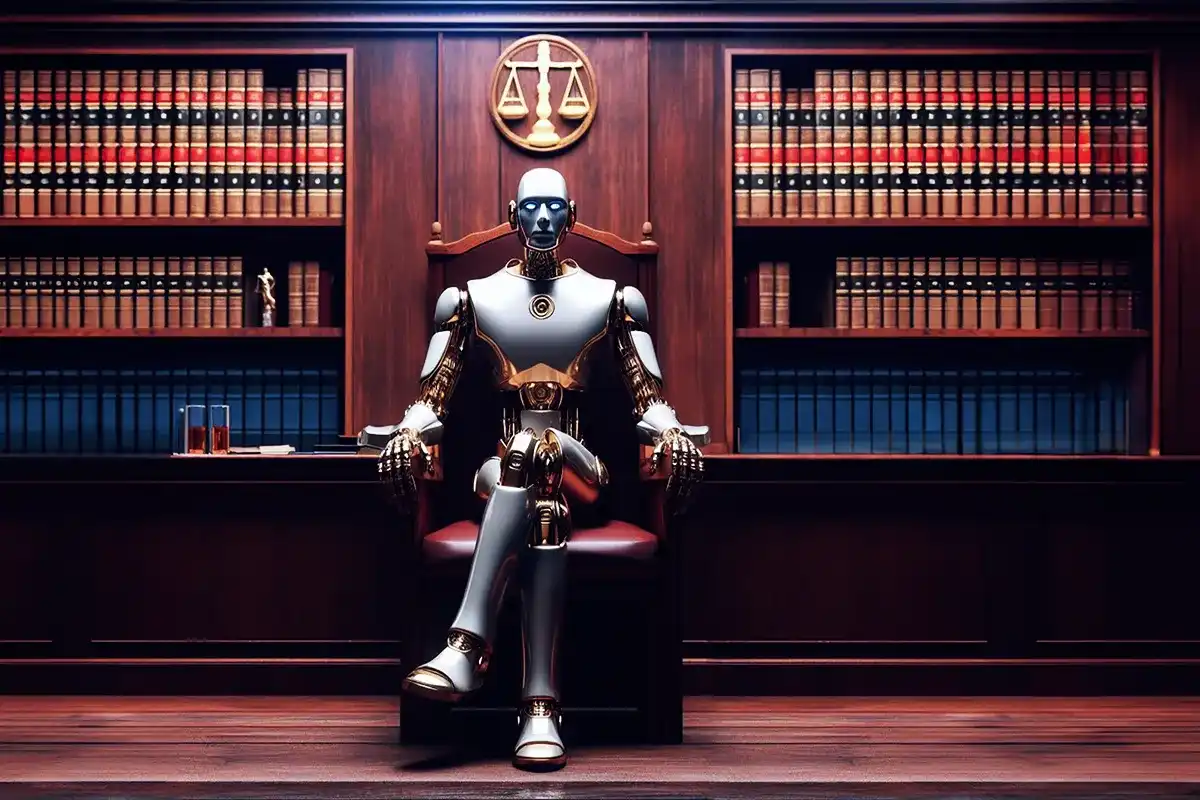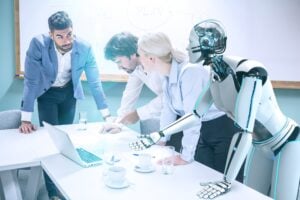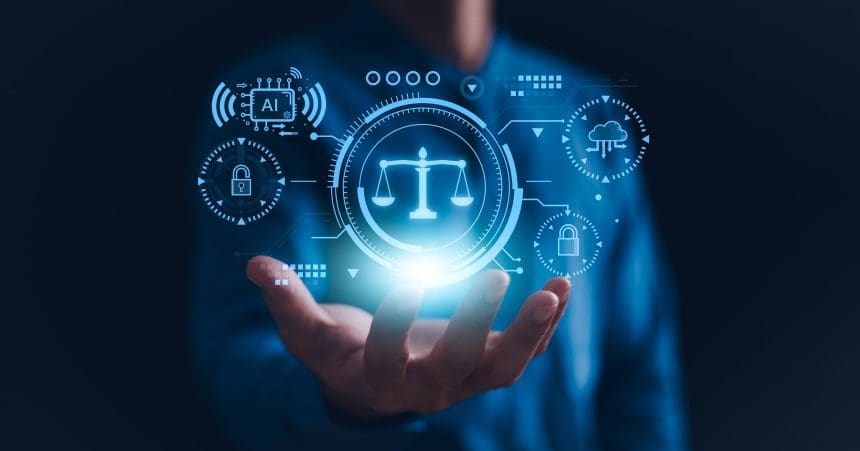You wake up, stretch, and casually ask your AI-driven economy assistant to brief you on your workday. As you sip your morning coffee, a holographic display materializes, showing your schedule, prioritized tasks, and even predictive AI-driven economy analytics on potential client behaviors. Welcome to the not-so-distant future of work, where artificial intelligence isn’t just a tool, but your ever-present colleague, personal assistant, and career coach rolled into one. Sound like science fiction? Well, buckle up, because this AI-driven economy is already underway, reshaping the very fabric of our economy and redefining what it means to ‘work’ in the digital age.
- The AI-Driven Economy: A Paradigm Shift in Employment
- Adapting to the Future of Work: Skills for the AI Era
- AI’s Impact on Workplace Dynamics and Culture
- Economic and Policy Implications of the AI Job Market
- Navigating the AI Workforce Revolution: Strategies for Success
- The Human Element: Thriving in an AI-Augmented World
Overview
- Explore how AI is transforming traditional job roles and creating new opportunities.
- Discover the skills essential for thriving in an AI-driven economy.
- Examine the changing dynamics of workplace culture and team structures.
- Investigate economic theories and policy responses to AI-induced job market shifts.
- Learn strategies for successfully navigating the AI workforce revolution.
- Understand the enduring importance of human skills in an AI-augmented world.
The AI-Driven Economy: A Paradigm Shift in Employment
Let’s dive headfirst into the deep end of the AI-driven economy job market pool, shall we? Brace yourself for a splash of reality that’s equal parts exhilarating and terrifying. Welcome to the brave new world of the AI-driven economy, where the only constant is change, and your college degree might have a shorter shelf life than that avocado you forgot in the back of your fridge.
First up on our tour of this brave new world: Automation and job displacement. It’s the elephant in the room, or perhaps more accurately, the robot in the cubicle. Let’s separate the myth from reality, shall we? Yes, AI-driven economy is coming for jobs, but it’s not the job-apocalypse some doomsayers would have you believe. It’s more like a grand reshuffling of the employment deck. Some jobs will disappear faster than your New Year’s resolutions, but others will emerge like phoenixes from the ashes of obsolete occupations.
Take, for example, the humble checkout clerk. As self-checkout kiosks become ubiquitous, traditional cashier roles are dwindling. But fear not! For every AI-driven economy that learns to ask “Paper or plastic?”, new roles are sprouting up. Think AI trainers, ethics officers, and data detectives. It’s like economic natural selection on steroids – adapt or become the career equivalent of a dodo bird.
But let’s not get too caught up in the jobs that are vanishing. Instead, let’s shine a spotlight on the emerging career paths in this age of artificial intelligence. We’re talking about jobs that would have sounded like science fiction a decade ago. AI-driven economy ethicists grappling with the moral implications of sentient machines, machine learning engineers crafting the digital brains of tomorrow, and human-AI interaction designers ensuring that our silicon colleagues don’t creep us out too much. It’s a job market that’s evolving faster than you can say “technological unemployment.”
Speaking of evolving job markets, let’s talk about the gig economy. If traditional employment is a monogamous long-term relationship, the gig economy is speed dating with a dash of AI matchmaking thrown in. Platforms powered by AI-driven economy are reshaping freelance work, connecting skilled professionals with projects across the globe. It’s like Tinder, but instead of swiping right for love, you’re swiping for your next paycheck. The future of work might not be a stable 9-to-5, but a series of gigs, each one matched to your skills with algorithmic precision.
Now, I know what you’re thinking. “But what about all those economic theories on technological unemployment? Isn’t AI going to leave us all jobless and fighting over the last can of beans in a post-apocalyptic wasteland?” Well, not quite. While it’s true that AI is disrupting the job market faster than you can update your LinkedIn profile, it’s also driving economic growth in ways we’re only beginning to understand.
Some economists argue that we’re on the cusp of a new era of productivity and innovation, where AI-driven economy acts as a multiplier for human creativity and ingenuity. Others warn of growing inequality and the need for radical policy solutions. It’s like watching economists engage in a high-stakes debate club, except instead of trophies, the future of our economy hangs in the balance.
As we navigate this shifting landscape, one thing is clear: the AI-driven economy revolution isn’t something that’s coming in some distant future. It’s here, now, reshaping our economy in real-time. The question isn’t whether AI will change the job market, but how we’ll adapt to these changes. Will we ride the wave of innovation to new heights of productivity and creativity? Or will we be left behind, like a flip phone in a world of smartphones?
The choice, in many ways, is ours. But one thing’s for certain – the future of work is going to be a wild ride. So strap in, keep your skills sharp, and maybe learn to code. Just in case.
Food for Thought: Consider your current job or career path. How vulnerable is it to AI automation? What new opportunities might AI-driven economy create in your field? How can you position yourself to thrive in this evolving landscape?
Adapting to the Future of Work: Skills for the AI Era
Alright, future-of-work warriors, it’s time to talk about the skills you’ll need to survive and thrive in the AI-driven economy job jungle. Forget everything you thought you knew about career planning – in this brave new world, your ability to adapt is more valuable than that dusty degree hanging on your wall. Welcome to the era of perpetual learning, where your skillset has the lifespan of a Snapchat message and “I’m not good with computers” is the professional equivalent of admitting you can’t read.
Let’s start with the elephant in the room: reskilling and upskilling. These aren’t just buzzwords to throw around at networking events (though they do sound impressive after a few cocktails). They’re your ticket to career longevity in a world where AI-driven economy is advancing faster than your receding hairline. The jobs of tomorrow? They probably don’t even exist yet. So how do you prepare for a career that hasn’t been invented? By becoming a learning machine yourself.
Think of your brain as a smartphone. In the AI era, you need to be constantly updating your mental apps, downloading new skills, and occasionally performing a complete system overhaul. That degree you’re so proud of? It’s like a flip phone in a 5G world. Useful, sure, but not exactly cutting edge. The key is to embrace lifelong learning with the enthusiasm of a kid in a candy store. Only instead of sugar, you’re getting hopped up on knowledge. Bonus: fewer cavities.
But before you rush off to learn Python or the intricacies of machine learning algorithms, let’s talk about the skills that AI can’t replace. You know, those pesky human traits that make us more than just organic computers. We’re talking emotional intelligence, creativity, critical thinking – all those soft skills that are about as easy to quantify as your grandmother’s love.
In a world where AI can crunch numbers and analyze data faster than you can say “algorithmic bias,” it’s these uniquely human recent content marketing survey skills that will set you apart. Can AI write a report? Sure. Can it deliver that report with empathy, read the room, and adjust its message on the fly? Not so much. It’s like being the only person who speaks human in a world of very intelligent parrots.
So, how do you cultivate these oh-so-human skills? Well, ironically, there’s no AI shortcut for this one. It’s all about putting yourself in diverse situations, embracing challenges, and yes, occasionally failing spectacularly. Think of it as going to the gym, but for your emotional intelligence and creativity. No pain, no gain – but instead of buff biceps, you get the ability to navigate complex human interactions and think outside the AI-generated box.
Now, let’s talk about the ultimate skill in the AI era: entrepreneurship. As traditional job markets get shaken up like a snow globe in the hands of an overenthusiastic child, the ability to create your own opportunities becomes invaluable. The good news? AI is lowering the barriers to entry for many industries. The bad news? Everyone else knows this too.
Starting a business in the AI age is like playing a video game on expert mode. You’ve got tools and capabilities your predecessors could only dream of, but the competition is fierce and the landscape is constantly changing. One day you’re disrupting an industry, the next day you’re being disrupted by a teenager with a clever algorithm and too much free time. But for those who can surf this wave of constant innovation, the opportunities are as boundless as an AI’s capacity to learn.
As we navigate this new landscape, we must ask ourselves some fundamental questions. How do we balance the need for technical skills with the cultivation of our uniquely human abilities? In a world of specialization, is it better to be a jack-of-all-trades or a master of one? And perhaps most importantly, how do we maintain our humanity and values in a job market increasingly shaped by artificial intelligence?
The future of work isn’t just about adapting to new technologies – it’s about redefining what it means to be a valuable, productive member of society. It’s about finding that sweet spot where human ingenuity meets technological capability. So as you chart your course through this AI-driven landscape, remember: the most important skill you can develop is the ability to keep developing skills. Stay curious, stay flexible, and for the love of all that is holy, backup your brain to the cloud. Just in case.
Reflective Exercise: Take a moment to assess your current skill set. What uniquely human-AI trust skills do you possess that would be difficult for AI to replicate? What technical skills might you need to develop to complement these? How can you create a personal learning plan that balances both?
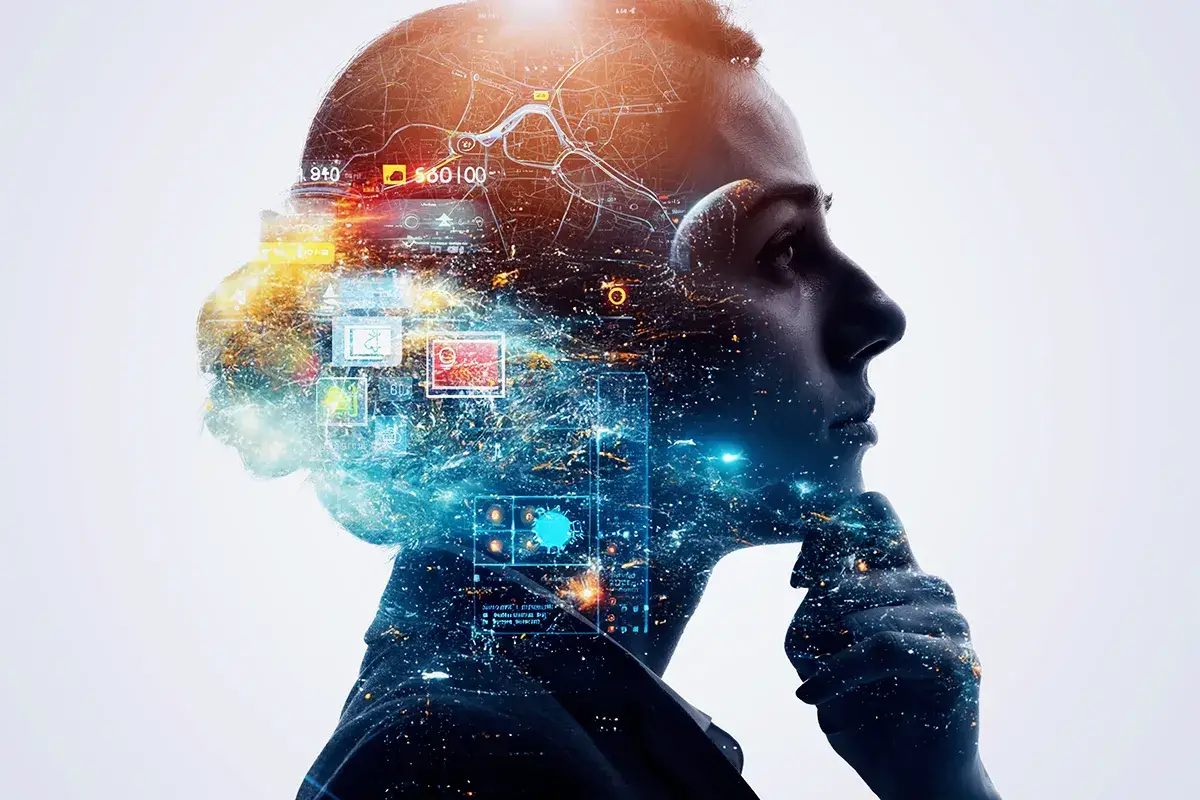
AI’s Impact on Workplace Dynamics and Culture
Buckle up, buttercup, because we’re about to take a wild ride into the future of workplace dynamics, where AI is the new coworker you never knew you needed (or wanted). Welcome to the brave new world of human-AI collaboration, where your team meetings might include both Bob from accounting and BOT from algorithmic processing. It’s like “The Office” meets “The Terminator,” minus the time-traveling assassins (we hope).
Let’s start with the elephant in the room – or should I say, the algorithm in the cubicle? Human-AI collaboration is redefining team structures faster than you can say “synergistic paradigm shift.” Gone are the days when teamwork meant gathered around a conference table, armed with nothing but notepads and mediocre coffee. Now, it’s more like being part of a high-tech orchestra, with AI conducting and humans providing the creative flair. It’s a delicate dance of silicon and carbon, where the challenge isn’t just completing tasks, but figuring out who (or what) should do them.
Imagine a workplace where your AI assistant not only schedules your meetings but also predicts which ones you’re likely to fall asleep in (based on a complex algorithm factoring in the presenter’s monotone voice and your late-night Netflix habits). It’s not about replacing humans, but augmenting our capabilities. Think of AI as the ultimate sidekick – it does the heavy lifting of data analysis and repetitive tasks, freeing you up to do what humans do best: creative problem-solving, interpersonal relationships, and finding new ways to look busy when the boss walks by.
But this human-AI tango isn’t just changing how we work – it’s revolutionizing where we work. Enter the remote work revolution, supercharged by AI. It’s like someone took the concept of “working from home” and injected it with a mega-dose of algorithmic steroids. AI-powered tools are making distributed teams more connected and productive than ever, turning the traditional office into a relic as quaint as a fax machine or a non-ironic mustache.
You’re in your home office (aka your couch), collaborating in real-time with team members scattered across the globe, while AI handles everything from language translation to project management. It’s like being in a virtual United Nations, minus the diplomatic immunity. The water cooler chat has been replaced by AI-curated digital hangout spaces, designed to foster the kind of spontaneous interactions that spark innovation. It’s all the benefits of office culture, without the drawbacks of pants or commuting.
But as we rush headlong into this brave new world of AI-augmented workplaces, we need to pump the brakes and consider the ethical implications. It’s all fun and games until your AI coworker starts making decisions that affect real human lives. How do we ensure fairness and transparency in AI-driven processes? What happens when the algorithm discriminates? It’s like opening a Pandora’s box of ethical dilemmas, except instead of hope at the bottom, we find a tangled mess of code and moral quandaries.
And let’s not forget about leadership in this new AI era. Managing a human-machine workforce is like herding cats, if some of those cats were made of circuits and powered by electricity. How do you motivate an AI? Give it a performance review? And more importantly, how do you foster a sense of unity and shared purpose in a team that’s part human, part machine? It’s a brave new world for managers, where emotional intelligence is just as important as technological savvy.
As we navigate these uncharted waters of AI-human collaboration, we must ask ourselves some profound questions. How do we maintain our humanity in a workplace increasingly shaped by artificial intelligence? How do we ensure that AI remains a tool for empowerment rather than a means of control? And perhaps most importantly, in a world where AI can handle an ever-growing list of tasks, what does it mean to be a valuable employee?
The future of work isn’t just about adapting to new technologies – it’s about redefining what it means to be human in an increasingly digital world. It’s about finding that delicate balance between leveraging AI’s capabilities and preserving the uniquely human elements that no algorithm can replicate. So as we step into this new era of human-AI collaboration, remember: the goal isn’t to compete with AI, but to create a symbiosis that brings out the best in both man and machine.
Just don’t get too attached to your AI coworker. Remember, it won’t appreciate your office birthday celebrations or awkward attempts at small talk. But on the bright side, it also won’t steal your lunch from the communal fridge. Small victories, people. Small victories.
Thought Experiment: Imagine your ideal AI-augmented workplace. What tasks would you delegate to AI? How would you structure your day? What new opportunities for creativity and innovation might arise? How would this change your relationships with human colleagues?
Economic and Policy Implications of the AI Job Market
Alright, policy wonks and armchair economists, it’s time to dive into the murky waters of economic theory and policy implications in our AI-driven future. Buckle up, because we’re about to take a wild ride through a landscape where traditional economic models go to die and policy makers are scrambling like cats on a hot tin roof. Welcome to the economic thunderdome of the AI era, where the only thing more volatile than cryptocurrency is the job market volatility research itself.
Let’s start with the elephant in the room, shall we? Universal Basic Income (UBI) – the Hail Mary pass of economic policy in the face of AI-induced job loss. It’s the idea that governments should just cut everyone a check, no questions asked, to cushion the blow of technological unemployment. Sounds great, right? Free money for everyone! But before you start planning your UBI-funded beach vacation, let’s consider the implications.
Proponents argue that UBI is the safety net we need in a world where AI might make traditional employment as obsolete as a phone booth. It’s like socialism, but with robots doing all the work instead of the proletariat. Critics, on the other hand, see it as a recipe for economic disaster and societal stagnation. After all, if everyone’s getting a check just for existing, who’s going to unclog the toilets or write the next great American novel? It’s the ultimate economic Rorschach test – your view on UBI probably says more about your political leanings than it does about its actual viability.
But UBI isn’t the only game in town when it comes to addressing the AI job market shake-up. Governments around the world are scrambling to implement workforce transition initiatives faster than you can say “technological unemployment.” We’re talking retraining programs, education reforms, and economic incentives, all aimed at creating a workforce more adaptable than a chameleon in a disco. It’s like trying to prepare for a hurricane while it’s already making landfall – urgent, chaotic, and with a high likelihood of unintended consequences.
And let’s not forget about our friends in the labor movement. The future of labor unions in an automated world is about as clear as mud. On one hand, AI and automation pose an existential threat to many of the industries unions traditionally represent. On the other hand, someone needs to advocate for the rights of human workers in an increasingly AI-driven economy. It’s like trying to unionize a workforce where half your potential members are made of silicon and circuits. Will we see the rise of human-AI hybrid unions? Strikes where picket lines are populated by both flesh-and-blood workers and sympathetic robots? The mind boggles at the possibilities.
Now, let’s zoom out and look at the global picture. The AI economy isn’t just reshaping individual job markets – it’s redrawing the map of global economic power faster than you can say “geopolitical shift.” Countries that get ahead in AI development and implementation stand to gain a massive economic advantage, while those that lag behind risk becoming the digital equivalent of a horse-and-buggy in a world of self-driving cars.
It’s like a high-stakes game of economic musical chairs, with nations scrambling to position themselves as AI powerhouses. The winners in this new world order might not be the countries with the most natural resources or the biggest populations, but those with the most advanced AI capabilities and the workforce to match. Imagine a future where the GDP of a small, tech-savvy nation outstrips that of traditional economic giants. It’s not just possible – it’s already starting to happen.
But this brave new world of AI-driven economy isn’t all rosy predictions and technological utopias. We need to talk about the potential for growing inequality – both within nations and between them. As AI increases productivity and wealth creation, there’s a risk that the benefits will be concentrated in the hands of a tech-savvy elite, leaving the rest of us to fight over the digital scraps. It’s like trickle-down economics, but the trickle is more of a drought for those without the skills to thrive in an AI economy.
So, what’s a policy maker to do in this rapidly evolving landscape? It’s like trying to write rules for a game while it’s being played, with the added challenge that the players keep inventing new moves. We need flexible, adaptive policies that can keep pace with technological change. We need education systems that prepare workers not just for the jobs of today, but for the jobs that haven’t been invented yet. And perhaps most importantly, we need a new social contract that redefines the relationship between work, worth, and well-being in an age where traditional employment might become the exception rather than the rule.
As we grapple with these challenges, we must ask ourselves some fundamental questions. How do we ensure that the benefits of AI-driven economy productivity are shared equitably? What does “full employment” even mean in a world where machines can do an ever-growing list of tasks? And perhaps most pressingly, how do we maintain social stability and purpose in a world where traditional work may no longer be the central organizing principle of human life?
The economic and policy implications of the AI job market are as vast and complex as the technology itself. We’re not just talking about tweaks to existing systems – we’re looking at a fundamental reimagining of how our economies and societies function. It’s exciting, it’s terrifying, and it’s happening whether we’re ready or not.
So, as we stand on the brink of this new economic frontier, let’s remember: the goal isn’t just to survive the AI revolution, but to shape it in a way that benefits all of humanity. It’s a tall order, sure, but hey – if we can teach machines to think, surely we can figure out how to use that technology to create a more equitable and prosperous world for all.
Just don’t be surprised if, in a few years, you find yourself explaining to your AI financial advisor why you still need money for avocado toast. Some things, it seems, will never change.
Interactive Challenge: Imagine you’re a policy maker tasked with preparing your country for the AI-driven economy. What three key policies would you implement? Consider aspects like education, social safety nets, and economic incentives. Share your policy proposals in the comments and discuss the potential impacts with others.
Navigating the AI Workforce Revolution: Strategies for Success
Alright, future-proof career seekers and AI-era survivors, it’s time to arm ourselves with strategies to navigate this brave new world of work. Think of this as your survival guide for the AI apocalypse – minus the zombies, plus a whole lot of algorithms. We’re about to embark on a journey that’s part “The Hunger Games,” part Silicon Valley pitch meeting, where the odds may not be ever in your favor, but with the right moves, you can definitely tilt them that way.
First up on our list of career-saving strategies: Embrace your inner chameleon. In the AI-driven economy job market, adaptability isn’t just a nice-to-have skill – it’s the difference between thriving and becoming as obsolete as a floppy disk. We’re talking about developing a mindset that’s more flexible than a yoga instructor on a rubber mat. The ability to pivot faster than a politician during election season isn’t just an asset; it’s a necessity.
But how, you ask, does one become this paragon of adaptability? Start by diversifying your skill set like you’re building the world’s most eclectic investment portfolio. Sure, specialize in your field, but also branch out into complementary areas. Are you a marketer? Learn some data analysis. A programmer? Dabble in UX design. It’s like cross-training for your brain – you’re building a career that’s as versatile as a Swiss Army knife and as resilient as a cockroach after a nuclear winter.
Next on our AI-proofing agenda: Embrace lifelong learning with the fervor of a convert to a new religion. The half-life of skills in the AI era is shorter than a Snapchat message, so continuous education isn’t just a good idea – it’s your ticket to staying relevant. Think of your brain as a smartphone that needs constant updates. Only instead of just getting new emojis, you’re downloading skills that keep you employable.
However, it’s not enough to just accumulate skills like you’re hoarding canned goods for the apocalypse. You need to develop meta-learning skills – literally, learning how to learn. It’s like becoming the CEO of your own personal education startup, where your product is your constantly evolving skill set. MOOCs, bootcamps, workshops – your learning venues should be as diverse as your Netflix watchlist.
Now, let’s talk about the ultimate career superpower in the AI age: human skills. Yes, you heard that right. While everyone else is scrambling to learn the latest programming language or AI framework, you should be doubling down on what makes you uniquely human. Emotional intelligence, creativity, complex problem-solving – these are the skills that will keep you relevant when AI can do everything else.
Think of it this way: In a world where AI can crunch numbers and analyze data faster than you can say “algorithmic bias,” your ability to navigate complex human emotions and social situations becomes your secret weapon. It’s like being the only person who speaks human in a world of very intelligent parrots. Cultivate these skills like you’re tending the world’s most precious garden, because in many ways, you are.
But let’s not forget about the importance of building your personal brand in this new landscape. In a job market where your next gig might come from an AI-powered matching algorithm, standing out from the crowd is crucial. It’s like being on a perpetual first date with potential employers or clients, where your online presence is your opening line. Curate your digital footprint with the care of a museum curator organizing a priceless exhibit. Blog, vlog, podcast – become a thought leader in your niche. Just remember, the internet never forgets, so maybe skip that 3 AM tweetstorm about your ex.
Lastly, and perhaps most importantly, don’t forget to nurture your network – both human and AI. Yes, you read that right. In the future, your professional network might include both flesh-and-blood contacts and AI entities. Attend industry events, sure, but also engage with AI-driven economy professional platforms. Who knows? Your next job recommendation might come from an algorithm that thinks you’d be perfect for a position you never even knew existed.
As we navigate this AI-driven economy career landscape, we must ask ourselves some fundamental questions. How do we balance the need for technical skills with the cultivation of our uniquely human abilities? In a world where change is the only constant, how do we build a career that’s both fulfilling and sustainable? And perhaps most importantly, how do we maintain our humanity and values in a job market increasingly shaped by artificial intelligence?
Remember, the goal isn’t to compete with AI-driven economy, but to complement it. Find the sweet spot where your human ingenuity meets technological capability. It’s about being the peanut butter to AI’s jelly, the Sherlock to its Watson, the… well, you get the idea.
So, as you set forth into this brave new world of work, armed with your adaptive mindset, your diverse skill set, and your finely honed human capabilities, remember: The future of work isn’t something that happens to you – it’s something you create. Now go forth and conquer, you magnificent, adaptable human, you.
Practical Exercise: Create a personal SWOT (Strengths, Weaknesses, Opportunities, Threats) analysis for your career in the AI age. What are your unique human strengths? What skills do you need to develop? What opportunities does AI-driven economy create in your field? What threats does it pose? Use this analysis to craft a personal development plan for thriving in the AI-driven economy.
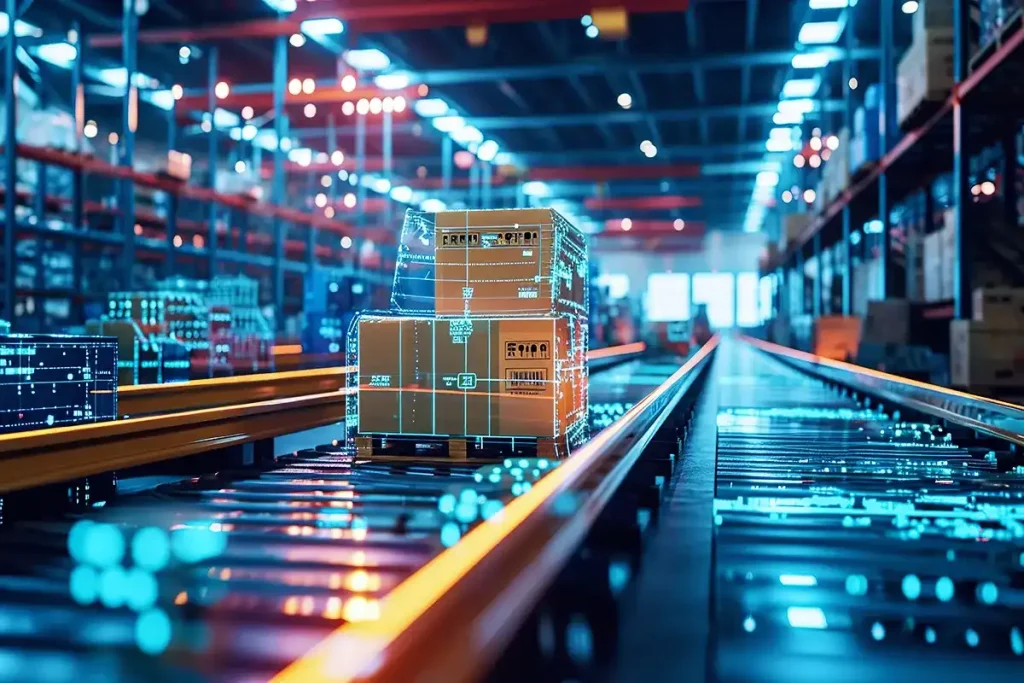
The Human Element: Thriving in an AI-Augmented World
And here we are, at the final frontier of our journey through the AI-driven job landscape. We’ve navigated the treacherous waters of automation, scaled the mountains of new skill requirements, and now we find ourselves face-to-face with perhaps the most important question of all: How do we maintain our humanity in a world increasingly shaped by artificial intelligence? Welcome to the ultimate showdown: Humans vs. AI, in the battle for relevance, purpose, and maybe even the fate of our species. (No pressure, right?)
First things first: Let’s address the robot-shaped elephant in the room. AI-driven economy is not the enemy. I repeat, AI is not the enemy. It’s more like that overachieving coworker who’s really good at certain tasks but still can’t figure out how to unjam the printer. The key to thriving in an AI-augmented world isn’t about competing with AI, but about doubling down on what makes us uniquely human.
So, what exactly makes us human in a world where machines can think? It’s not our ability to process information quickly (sorry, humans, but AI has us beat there). It’s not our capacity to work tirelessly without breaks (again, advantage: machines). No, what makes us uniquely human is our ability to feel, to empathize, to create, and to connect on an emotional level.
Think about it: When was the last time you were deeply moved by a spreadsheet? (If your answer is “just yesterday,” you might want to get out more.) Humans have the incredible ability to inspire, to motivate, to comfort, and to lead in ways that no machine, no matter how intelligent, can replicate. It’s like we’re emotional jazz musicians, riffing on the complexities of human experience in ways that can’t be reduced to ones and zeros.
So, how do we cultivate these uniquely human traits in an AI-dominated world? Start by embracing your inner weirdo. Yes, you heard that right. In a world where efficiency and optimization are the norm, your quirks, your unique perspective, and your ability to think outside the algorithmic box become your superpower. It’s like being the one person at a black-tie event wearing a Hawaiian shirt – you’ll stand out, and in this case, that’s a good thing.
Next, focus on developing your emotional intelligence like your career depends on it (because, well, it does). This isn’t just about being nice to people (although that’s a good start). It’s about honing your ability to read between the lines, to understand subtext, to navigate complex social situations. Think of it as becoming a Jedi master of human interaction, where your empathy is your lightsaber.
But thriving in an AI-augmented world isn’t just about developing your soft skills. It’s also about learning to work in harmony with AI, like a well-choreographed dance between man and machine. This means understanding AI well enough to know its strengths and limitations, to know when to lean on it and when to trust your human intuition. It’s about becoming a skilled AI wrangler, able to harness the power of these digital tools without being dominated by them.
And let’s not forget about the importance of creativity and innovation. In a world where routine tasks are increasingly automated, the ability to think creatively, to connect disparate ideas, to innovate, becomes more valuable than ever. It’s like being the one person in a world of paint-by-numbers who can create an original masterpiece. Cultivate your creativity like it’s a rare and precious plant, because in the AI era, that’s exactly what it is.
But perhaps the most important aspect of maintaining our humanity in an AI-augmented world is remembering the importance of human connection. In a world where it’s possible to go days without interacting face-to-face with another human being, making the effort to connect becomes a radical act. It’s like being the one person at a silent disco who takes off their headphones and starts a real conversation.
As we navigate this new landscape, we must ask ourselves some fundamental questions. How do we use AI to enhance our humanity rather than replace it? How do we ensure that in our quest for efficiency and optimization, we don’t lose sight of the messy, complex, beautiful aspects of human existence that give life meaning? And perhaps most importantly, how do we shape the development of AI to reflect our highest values and aspirations as a species?
The future of work – indeed, the future of humanity – in an AI-augmented world is not predetermined. It’s a future that we have the power to shape, to mold according to our values and our vision of what it means to be human. It’s a future where AI handles the routine, the repetitive, the predictable, freeing us to focus on the creative, the empathetic, the inspirational aspects of work and life.
So, as we stand on the brink of this new era, let’s not think of it as humans vs. AI, but as humans and AI, working together to create a future that’s better than anything either could create alone. Let’s use AI to augment our capabilities, to free us from drudgery, to solve complex problems. But let’s also fiercely protect and cultivate those qualities that make us uniquely human – our creativity, our empathy, our ability to love, to dream, to imagine.
Because in the end, the most important element in an AI-augmented world isn’t the latest algorithm or the most advanced neural network. It’s you. Human, flawed, creative, emotional, irrational, brilliant you. So go forth, embrace your humanity, and show the world what it truly means to be human in the age of AI.
Final Reflection: Take a moment to imagine your ideal role in an AI-augmented world. How does it leverage both AI capabilities and your unique human skills? What impact does it have on the world? How does it reflect your values and passions? Share your vision in the comments and let’s inspire each other to create a future where humans and AI work together to create something truly extraordinary.




